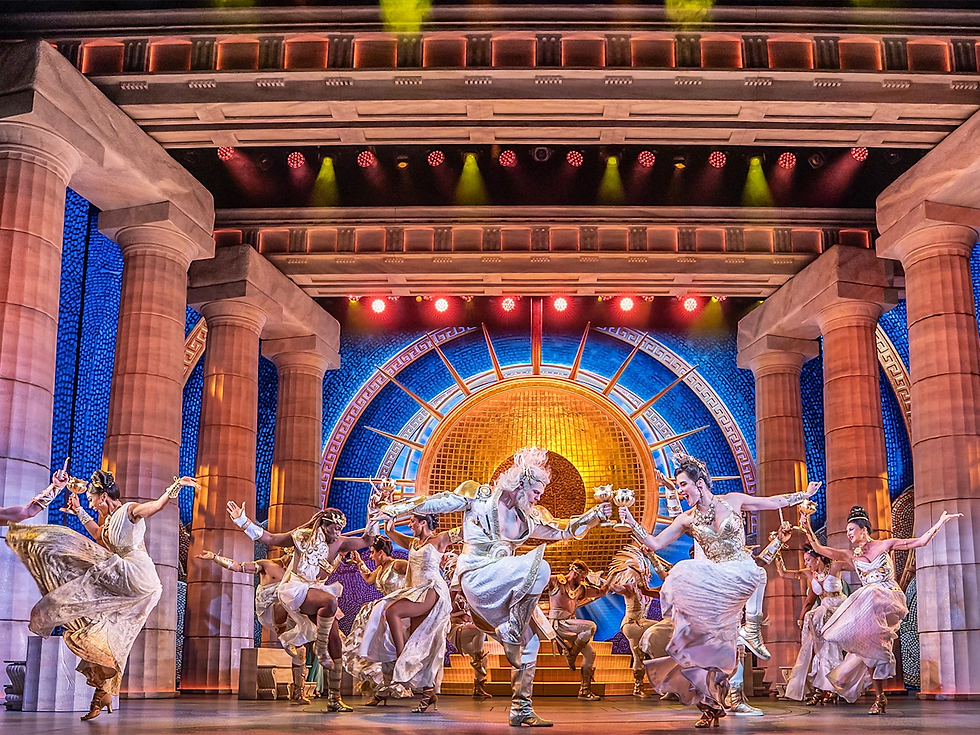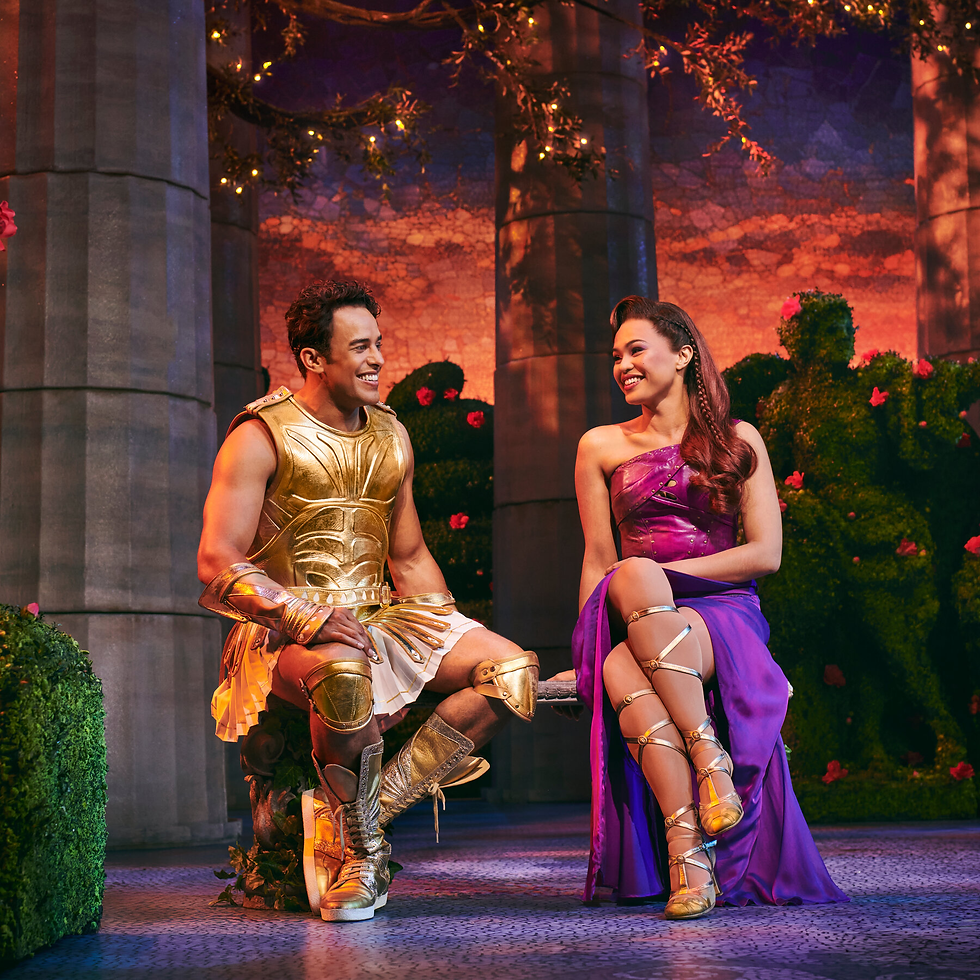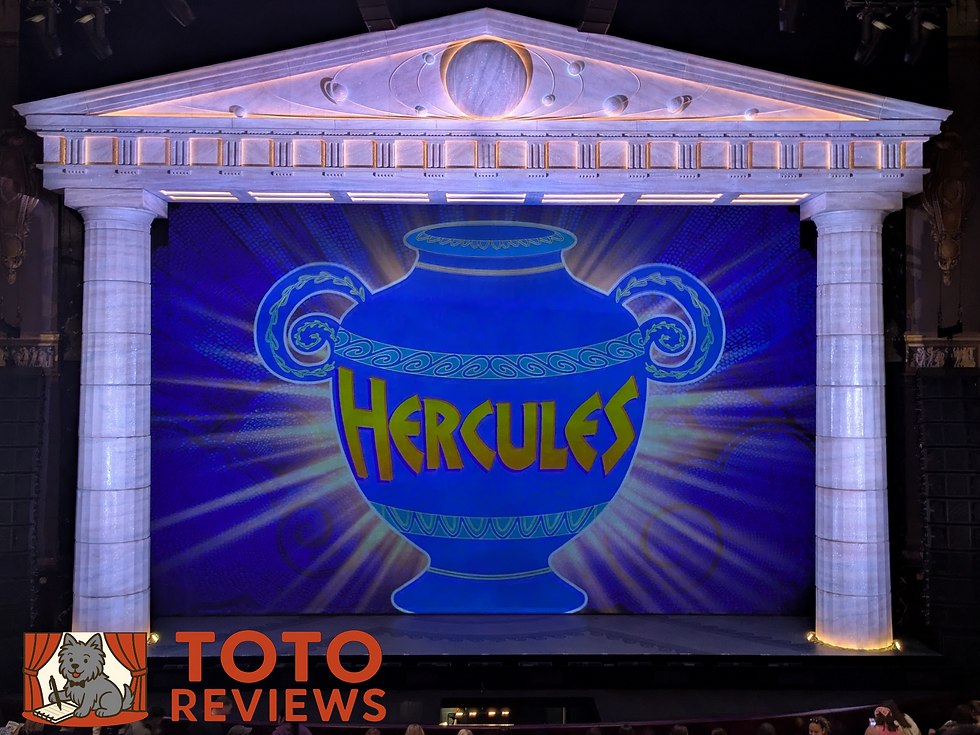Disney's Hercules AT THEATRE ROYAL DRURY LANE, LONDON
- Aug 11
- 8 min read
Hero to Zero…Just Like That!
Disney’s Hercules first hit cinema screens in 1997, during what many consider the golden age of Disney animation. The 1990's gave us a remarkable run of beloved classics like Beauty and the Beast, Pocahontas, The Lion King, Aladdin, The Hunchback of Notre Dame, and Mulan, each remembered for their captivating stories and unforgettable musical scores that continue to resonate with audiences of all ages. Hercules holds its place among these hits thanks to its vibrant animation, sharp, fast-paced humour and an energetic gospel inspired soundtrack composed by the legendary Alan Menken. With such strong ingredients, it seemed destined for success as a stage adaptation. So why then did this promising recipe result in such a disaster?
The biggest issue with this underwhelming production lies in the script, adapted from the original film by Robert Horn and Kwame Kwei-Armah. On paper, their involvement is promising, Horn has had success with shows like Shucked and Tootsie, while Kwei-Armah is known for Blues Brothers and One Love: The Bob Marley Musical. With such impressive credentials, you'd expect them to have all the tools to bring Hercules to life on stage. Unfortunately, what we get instead is a script that feels cheap, clumsy and deeply disconnected from the heart of the film.
To be clear, a stage adaptation shouldn’t be a carbon copy of the movie. Some reinvention is not only expected but necessary to make the production feel fresh. However, this version seems to have stripped away nearly all the charm, wit and memorable quotes that fans hold dear. Rather than clever dialogue or nods to beloved lines, the show is filled with one-liner jokes that feel more at home in a Christmas cracker than on a West End stage. The result is a script that lacks substance, emotional depth and storytelling clarity. The emotional core of the film, particularly the romance between Hercules and Meg is virtually absent. Instead, the plot gets lost in a sea of gags, with little attention paid to character development or narrative structure.
There are also very strange choices, such as the baffling decision to replace Hades’ iconic henchmen, Pain and Panic, with two nearly identical characters named Bob and Charles. Their personalities remain the same and they even reference their original names in a wink-wink moment during Act 2, raising the question, why change them at all? Other character choices are equally perplexing. Zeus, Hercules’ father, appears bizarrely younger than Hercules himself and sports a costume that makes him look more like Jesus from The Book of Mormon than a Greek god.

It’s only fair to acknowledge that amidst the production’s shortcomings, there were some clear highlights, most notably the set design, which was genuinely impressive. Upon entering the auditorium, you're immediately welcomed by a striking Hercules logo dominating the stage, while the proscenium arch is cleverly styled to resemble ancient Greek ruins, setting the tone beautifully before the show even begins. When the curtain rises and we’re transported to Mount Olympus, the visuals are genuinely striking. A particularly memorable moment is the entrance of the Muses, each rising from individual podiums through trap doors, a clever piece of stagecraft that adds real theatrical flair and instantly delights the audience, earning enthusiastic cheers. Equally impressive is the depiction of the underworld, which embraces a dark, eerie aesthetic. A moving bridge rises and falls across the stage, reminiscent of Phantom of the Opera, while thin, flowing white fabrics are blown by hidden fans to represent drifting spirits which is an effective visual touch. One of the new settings introduced in this adaptation is “Medusa’s Diner,” where Hercules first meets Phil. The set here is playful and well-executed, framed by large stone-like structures that resemble a prehistoric café, almost as if it were plucked from The Flintstones. It’s also the only moment in the entire show where Hercules’ godly strength is convincingly showcased, as he lifts the entire diner set and gently places it back down. The set is bathed in vibrant, colourful lighting throughout, while the large projection screen at the back of the stage adds depth, making the scenery feel more expansive and animated.
One of the elements I was most looking forward to was how the production would bring the iconic monsters and Titans to life, especially the enormous Hydra. With Disney behind the show, I anticipated something impressive, perhaps a large-scale puppet or animatronic and initially, it looked promising. The Hydra first appears as a single-headed, snake-like puppet with a menacing face and sharp teeth emerging from the rocks, an effective and exciting start. But after Hercules swiftly cuts off its head, the anticipation builds for a grand multi-headed reveal, which sadly never arrives. Instead, ensemble members rush onstage wearing scaly costumes and holding separate Hydra heads, running in circles during a chaotic and confusing fight sequence. What should have been a thrilling moment quickly turns into a disjointed mess. Immediately following the Hydra’s defeat is the song “Zero to Hero.” In the film, this song shows Hercules’ rise to fame through a series of dynamic battle montages. The stage version attempts the same idea, but unfortunately, the monsters featured are more laughable than impressive. There’s a cyclops that resembles a Shrek mascot, a Minotaur and a strange oversized dog-like creature, all of which look like they’ve wandered in from a Power Rangers episode rather than a Disney production.
I was also curious to hear the new songs introduced in the stage adaptation. As with most screen-to-stage productions, additional numbers are often added to give the show a fuller Broadway feel. Sometimes these are brand new compositions and other times they’re songs originally written for the film but later cut, like “Proud of Your Boy” from Aladdin or “Human Again” from Beauty and the Beast. Unfortunately, in Hercules, none of the new songs leave a lasting impression. In fact, without a programme, I doubt I could name a single one. They lack the memorable melodies and emotional weight we’ve come to expect from Disney musicals. The one exception comes late in Act 2 with “Great Bolts of Thunder”, sung by The Muses as Hercules prepares to save the day. This number stands out with its high energy and clearly channels the spirit of Bonnie Tyler’s “Holding Out for a Hero.” It’s the only new song in the show that feels both original and genuinely exciting.
What truly saves this production are The Muses, portrayed by Candace Furbert, Sharlene Hector, Brianna Ogunbawo, Malinda Parris and Robyn Rose-Li. Each performer brings powerhouse vocals and infectious energy to the stage and every time they appear, the iconic gospel numbers from the film are delivered with flair, fun and vocal brilliance. Their presence consistently lifts the mood of the show. Even during weaker moments, I found myself smiling and bopping along in my seat whenever they took the spotlight. Without The Muses, the production would have completely fallen flat. They are, without question, the heart and soul of the musical and its saving grace. That said, I was disappointed by one particular creative decision involving the song “I Won’t Say I’m In Love.” In the film, The Muses appear as statues, serving as Meg’s soulful backup singers. On stage, the setup initially hints at a similar concept, as Meg begins singing in a garden setting, bush-shaped topiary figures resembling women are wheeled on. I expected these to come to life as The Muses but instead, they remain purely decorative, while The Muses simply walk on from behind them, a missed opportunity for what could have been a visually imaginative moment.

Taking on the role of Phil, is beloved figure on the West End stage and no stranger to Disney musicals, Trevor Dion Nicholas. Having wowed audiences as the Genie in Aladdin and performed in Disney’s Broadway Hits at the Royal Albert Hall, he seemed like a perfect fit for this part. On paper, it feels like a role tailor-made for him. Unfortunately, the script gives him very little to work with. Like much of the show, Phil’s character has been stripped of the emotional core and humour that made him so compelling in the original film. In the movie, Phil is a washed-up trainer, disillusioned after a series of failed heroes. His journey with Hercules is one of redemption, concluding in a moving moment of pride when Hercules finally triumphs. In this stage version, that emotional arc is nowhere to be found. Phil’s backstory is barely touched on and his relationship with Hercules lacks any real development or payoff. The creative decision to remove his iconic goat-like appearance in favour of a plain green tracksuit is also puzzling. Instead of feeling like a mythological figure, he comes across as a standard gym personal trainer which flattens the character even further. To his credit, Trevor sings well and brings energy to the role, but he’s ultimately let down by a script that offers him little substance. The potential is there, but the character simply isn’t given enough to make a lasting impact.
The same issues with weak character development extend to the roles of Meg and Hercules, played by Mae Ann Jorolan and Luke Brady. I was familiar with Brady from The Prince of Egypt, a stage adaptation that I felt handled its source material far more successfully. He gave a strong performance in that show and I was hoping for something similar here. Unfortunately, he’s given very little to work with. Like the rest of the cast, he’s saddled with clunky one-liners in place of meaningful dialogue and even his big numbers lack impact. Go the Distance is a song with the potential to be a powerful musical theatre ballad but falls disappointingly flat. The arrangement never builds emotionally or musically and there’s no shift in key and no dramatic build. It left me wondering why the creative team didn’t draw inspiration from the post-credits version sung by Michael Bolton, which would have brought the emotional weight the moment desperately needed. Brady’s performance is perfectly competent, he sings well and commits to the role, but the material doesn’t allow him to shine.
Mae Ann Jorolan, in her role as Meg, is much the same. This was my first time seeing her perform and she immediately stood out with a striking stage presence and one of the strongest voices of the evening. She brings the right mix of sass and sarcasm to Meg, capturing the character’s essence. Yet again though, she’s let down by a thinly written role. Despite having the talent to elevate the part, there simply isn’t enough depth in the script for her to create a fully realised character.

Hades, played by Stephen Carlile, was sadly one of the most underwhelming characters in the entire production. The iconic villain we know from the film who is sharp-tongued, sarcastic, very short-tempered and endlessly entertaining, is nowhere to be found. In this version, Hades feels forgettable and flat. There’s little explanation given for his hatred of Hercules, the purpose of his henchmen or why Meg is working for him. These characters simply exist on stage without any real context or motivation. Stephen Carlile is clearly a capable actor, but he’s given almost no opportunity to tap into the villainous charm that makes Hades such a fan favourite. The dialogue is poorly written, robbing the character of his trademark wit and energy and none of his musical numbers leave a lasting impression. The costume design doesn’t help matters. While it’s understandable that recreating Hades’ flaming hair on stage poses a challenge, it would have been nice to see some creative fire-inspired elements integrated into his look. Instead, he’s dressed in a basic red jacket and trousers, hardly the dramatic flair you’d expect from the God of the Underworld. Even Hades’ downfall is disappointingly anticlimactic. (Spoiler alert!) His "punishment" is simply being sent back to the Underworld, the very place he’s ruled for eternity. It’s hardly a satisfying or meaningful defeat for a Disney villain of his stature.
Ultimately, the biggest flaw in this production is its script. While it loosely follows the structure of the film, it fails to actually tell the story in any meaningful or coherent way. If you’re a fan of the modern Palladium pantomimes full of stand-up routines and slapstick rather than faithful storytelling you might find this version of Hercules entertaining. But for longtime Disney lovers or fans of the original movie, this stage adaptation is likely to feel like a missed opportunity, if not a total misfire.
⭐⭐

SEAT REVIEW
Venue: Theatre Royal Drury Lane, London
Seat location: Circle, Row D, Seat 25.
Fantastic view of the stage, clear, central and hard to beat. Easy access to the aisle and just a short walk to the bars and restrooms. I'd definitely choose these seats again





